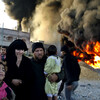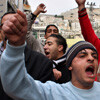
Meet the Lebanese Press: Gazing towards Gaza
29 December 2008
Like much of the world press, Israel’s war on Gaza dominates the headlines in Lebanon. Massive protests in Beirut, particularly at the Egyptian embassy, took place. In an address to the tens of thousands of demonstrators, Hizballah Secretary General Hassan Nasrallah called, among other things, for ordinary Egyptians to open up the crossing at the Egypt-Gaza border by force and in defiance of government security forces. Nasrallah’s explicit condemnation of the Egyptian regime and the stern response by Egyptian Foreign Minister Ahmed Aboul Gheit reflects the long-term impact of the Gaza war on the dynamics of regional alliances playing out in Lebanon. Read more about Meet the Lebanese Press: Gazing towards Gaza








